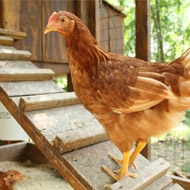Salmonella cases on the rise - report

The prevalence of Salmonella in laying hens has increased from 0.7 per cent to 1.21 per cent.
Cases of Salmonella are no longer falling in the EU, according to the annual report on zoonotic diseases.
The joint report by the European Centre for Disease Prevention and Control (ECDC) and the European Food Safety Authority (EFSA) found that cases of Salmonella enteriditis in the EU have increased in humans by three per cent since 2014.
In laying hens, the prevalence increased from 0.7 per cent to 1.21 per cent in the same period.
“The increase shown by our surveillance data is worrying and a reminder that we have to stay vigilant,” said Mike Catchpole from the European Centre for Disease Prevention and Control. “Even in a state of high awareness and with national control programmes for S. Enteritidis in place, there is a need for continuing risk management actions at the Member State and EU level.”
Marta Hugas from the European Food Safety Authority added: “The decrease of Salmonella has been a success story in the EU food safety system in the last 10 years. Recent S. Enteritidis outbreaks contributed to a change in this trend in humans and poultry. Further investigations by competent authorities in the field of public health and food safety will be crucial to understanding the reasons behind the increase.”
In 2016, there were 94,530 human cases of Salmonella reported in the EU. The most common form of Salmonella accounted for 59 per cent of all cases originating in the EU. The infection is most associated with the consumption of eggs, egg products and poultry meat.
The report found that S. Enteritidis caused one in six food-borne disease outbreaks in 2016. Salmonella bacteria were the most common cause of food-borne outbreaks (22.3 per cent) - an increase of 11.5 per cent compared to 2015.
Salmonella outbreaks also caused the highest burden in terms of numbers of hospitalisations and deaths. Salmonella in eggs caused the highest number of outbreak cases -1,882.
The report also shows that campylobacter and listeria are also on the rise. Campylobacter was found in 246,307 people - an increase of 6.1 per cent compared with 2015. Listeria was reported in 2,536 people - an increase of 9.3 per cent.



 The Veterinary Medicines Directorate (VMD) is inviting applications from veterinary students to attend a one-week extramural studies (EMS) placement in July 2026.
The Veterinary Medicines Directorate (VMD) is inviting applications from veterinary students to attend a one-week extramural studies (EMS) placement in July 2026.